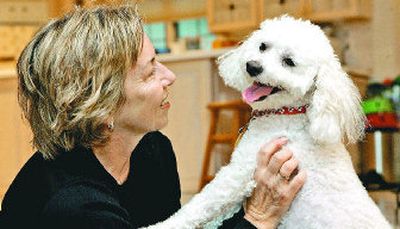Train dog to handle your absence

One of the most common and frustrating behavior disorders in dogs is separation anxiety. Most dogs experience some stress or anxiety when we leave them to go to work or school. After all, they are pack animals, so being left alone all day does not come naturally to them. Despite this, most dogs adapt to our absence, spend a good deal of their day sleeping, and then are overjoyed to see us when we return.
A dog with separation anxiety exhibits signs of fear during the owner’s preparations for leaving the house. He may pace, drool, whine, or follow his owner all over the house. After the owner is gone, the dog may be destructive (possibly trying to escape the area in which he’s confined in order to find his owner), he may urinate or defecate in the house, he may bark or howl excessively or he may do all three of these things.
Chewing the windowsill or pooping in the dining room are behaviors that get dogs brought to the vet for a diagnosis. Neighbor complaints may alert the owner to a barking problem. However, some dogs with separation anxiety are quiet. They may lie perfectly still with their ears down, and drool, vomit, or be unable to eat or drink until their owners are back and their fear is alleviated.
Dogs with separation anxiety are overly enthusiastic about greeting their owners at the end of the day, and it may take a long time for them to calm down again. Part of the therapy for these dogs is to ignore them when you return home until they settle down.
Your vet will take a detailed history to diagnose separation anxiety. A dog that does not show any concern during your departure but has eaten the sofa in your absence may just be doing normal “young dog chewing” and not have separation anxiety. Likewise, a dog that pees in your son’s bedroom every day may have a urinary tract infection, may be marking territory, or may never have been completely housebroken.
The combination of signs of anxiety when you leave – destruction, vocalization or inappropriate elimination after you’re gone (usually fairly soon afterward), and an excessively long and overwrought greeting when you return – must all be present to make a certain diagnosis.
Even if the signs are classic for separation anxiety, there could be an underlying medical problem that is causing your dog’s stress level to rise. This is especially true in older dogs who are newly exhibiting signs of separation anxiety. Some dogs may have other phobias that can be mistaken for separation anxiety.
Once medical conditions have been ruled out, behavioral therapy can be initiated. Dogs with separation anxiety tend to be overly dependent on their owners, often following them or keeping them in sight at all times. Spend time walking your dog, throwing the ball, and playing, but ignore her when she seeks attention by licking your hand or jumping up. Remember, you’re trying to teach your dog to feel secure without constant attention from you. Teach her that she gets praise or treats when she settles down in her bed or kennel.
Another part of training is to go through your normal departure routine several times a day, but then don’t leave. Do this as often as possible until your dog exhibits no signs of fear during the process. Eventually, you’ll be able to leave for short periods without causing anxiety. Your vet can work with you to give more detailed instructions on how to do this “desensitization” or can refer you to a behaviorist who can help.
Distraction with a food-stuffed toy or chewie during departure can also help keep dogs from getting wound up before you leave. However, some dogs are so stressed that they cannot learn from all this training. Those dogs may benefit from anti-anxiety medications or dog-appeasing pheromone diffusers during the training process.
Separation anxiety cannot be resolved overnight, but it has a good prognosis and usually can be improved without medication.